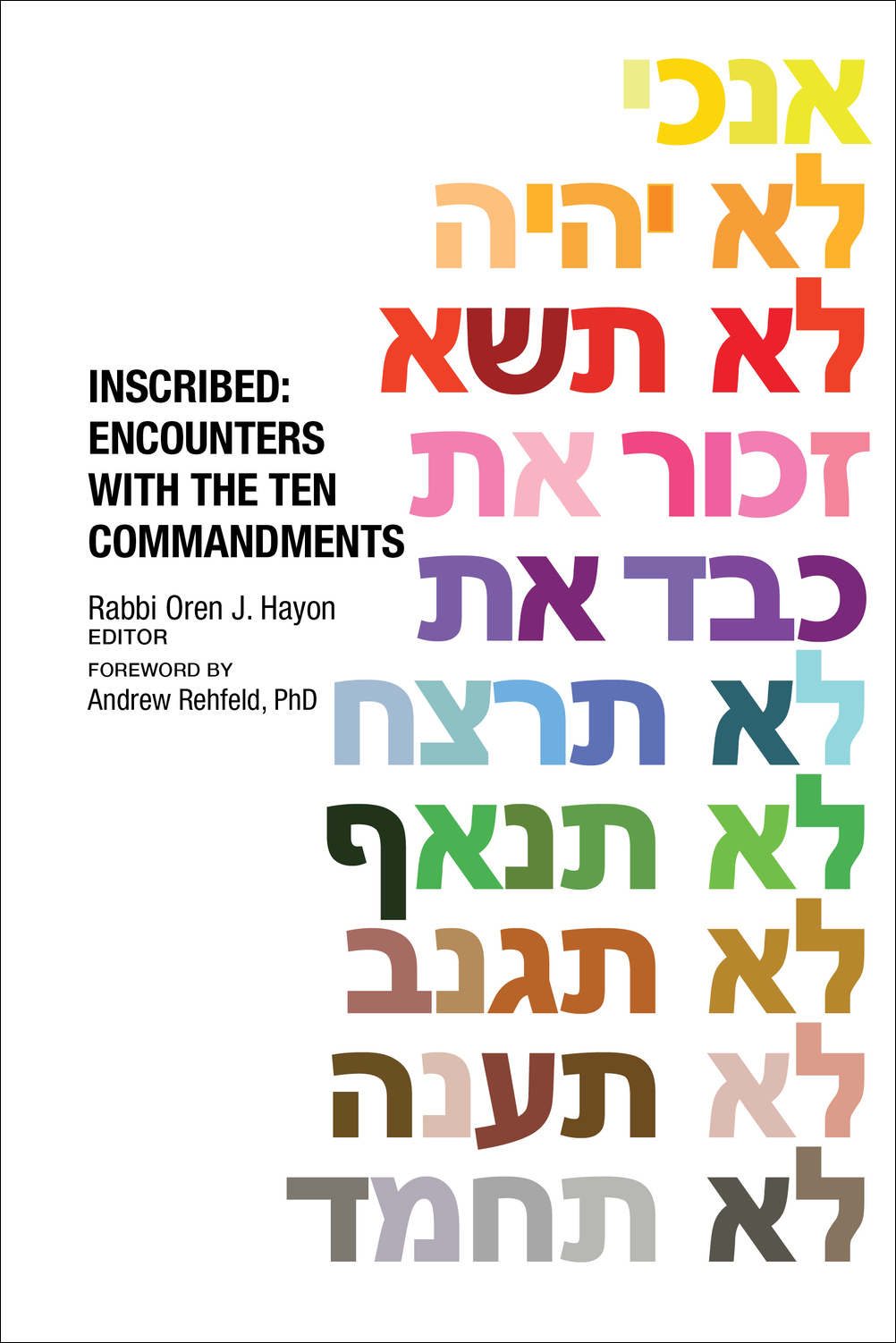
In this excerpt from her chapter “‘Technology Shabbats’: Unplugging in a Hyper-Connected World,” Tiffany Shlain writes about the value of abstaining from using technology on Shabbat. The complete version of this chapter can be found in Inscribed: Encounters with the Ten Commandments.
“Thou Shalt Unplug”
Jews have contributed so many things to the world. Some are widely admired (like the Theory of Relativity, the polio vaccine, anthropology, and psychoanalysis), and others are more debatable (like Barbie dolls and gefilte fish). Our best contribution? For me, there is no question: it is Shabbat.
I know observant Jews have always kept a day of rest, but many of us (like the 41 percent of American Jews who identify as secular) tend to roll right by Shabbat. Yet our contemporary 24/7 society demands more from us: the risk of overstimulation and oversaturation require us to turn off the firehose of media, news, e‑mails, tweets, posts, likes, texts, pings, notifications, and buzzes periodically so we can truly be protected by what Rabbi Abraham Heschel calls “a palace in time.” We need to enter into that palace and shut the door for twenty-four hours.
That is exactly what my family has done for a decade. We call it “Technology Shabbat,” a reinvented version of an ancient innovation. Turning off technology is a ritual that can give you back your attention and time and let you focus on what matters most: the essence of Shabbat.
In a way, Shabbat itself is a technology. Three thousand years ago, it was an invention that completely transformed the world. Before then, time had no pauses; it was day after day after day. The invention of Shabbat made it so each week ended with a day of rest. The run-on sentence of time got a period, and everyone got a chance to catch their breath and focus. Thousands of years later, Shabbat lets us be present with each other, appreciate the small things, daydream, find perspective, and think big-picture thoughts. Returning to a slower pace one day a week also lets us be more fully present on the other six.
I have great respect for wherever people fall on the spectrum from atheist to believer, but I strongly feel that whether you believe, do not believe, or are agnostic, it is advisable to consider ideas that have lasted millennia. The Ten Commandments are a perfect example, and it is worth noting that “remember the sabbath day and keep it holy” (Exodus 20:8) is number four. Four! That’s pretty high up on a list of ten! For me, personally, keeping this day without technology has been the best practice I have ever incorporated into my life. I get why it is in the top five. The Internet came along a few thousand years after the commandments, and “Thou shalt unplug” is not exactly the wording of the law. But it is definitely the spirit! And observing the fourth commandment in the updated way of Tech Shabbat can renew our spirits every week.
Here is what our house is like every Friday evening as we prepare to close the door on that nonstop world: The smells of rosemary, garlic, onions, chicken, and freshly baked challah fill the house. All the piles of papers and books and laptops that normally lay claim to the kitchen table are put away, and the table is set with freshly cut flowers, candles, and a tablecloth. When the doorbell rings, everything gets powered down. Our daughter Blooma (age eleven) shuts down the iPad, and Odessa (age seventeen) turns off her laptop. I usually do one last tweet at sunset, telling people I am shutting down and that I will “see them on the other side.” Then I turn my phone off. It takes a little bit to adjust. Sometimes, at the beginning of Friday night, I have a phantom-limb-like sensation when I try to reach for a phone that is not there, to look something up or make a call. I keep a piece of paper out on the kitchen counter with a big black Sharpie, and for the first couple of hours, I jot down whatever combination of to-dos or reminders that tumble from my head. Then I feel set free, with a full day of space to think and be — without responding to all the news, dings, pings, buzzes, and notifications. A protected twenty-four hours.
Guests arrive and we sit down before a sumptuous meal. We light the candles, sing the blessings (off-key), break the homemade challah, and discuss the world and the week. “What was one thing you learned this week or one thing that you want to let go of? One thing you are grateful for or one thing you are looking forward to next week?” We answer in a clockwise conversation around the table, everyone getting enough space and attention, as we treat time like a special guest in our home.
The sleep of Friday night is the deepest sleep I have all week. We spend the next day together: journaling, hanging, being in nature, cooking, doing art projects, enjoying each other’s company, or just being. Later, maybe a bike ride, a nap, a board game, a great book. It’s the best day of the week.
Establishing our weekly Tech Shabbat was the best decision we ever made as a family and as individuals. This practice has enabled us to compartmentalize stress and ultimately reduce it, feel more creative, present, and happy, and be more productive for the rest of the week. Tech Shabbat makes the best day of the week feel longer and the rest of the week feel better. It is like having a metaphysical remote control that lets you slow down the good parts and fast-forward through the commercials.
This practice has enabled us to compartmentalize stress and ultimately reduce it, feel more creative, present, and happy, and be more productive for the rest of the week.
A lot of people are looking for something like this. They’re flocking to yoga studios, meditation retreats, and tech detox camps, seeking environments that help them turn off their phones. People are craving this space to be present. There has also been a renaissance of old concepts made new for the modern age, everything from meditation to growing your own food. People are hungry for updated versions of the old ways — ways like our Shabbat. Even Vogue magazine agrees: “Shabbat … is for everyone. It is an ancient antidote to our modern ailments.”[1]
The revolutionary act of unplugging one day every week is simple and transformative. As Anne Lamott says, “Almost everything will work again if you unplug it for a few minutes, even you.”[2]
It took me a while to find my way here, however.
Over a decade ago, I needed a drastic change. Within days of each other, my father, Leonard Shlain, whom I was incredibly close to, died of brain cancer, and my husband’s and my daughter, Blooma, was born. I was asked to articulate the colliding of these profound events in a six-word memoir: “Father’s funeral. Daughter’s birth. Flowers everywhere.”
These life-altering events made me think about the brevity of our time here on this earth and question how I was spending it. I didn’t like where we seemed to be headed, with everyone staring at screens instead of connecting with the people we love, sitting right in front of us. I needed a revolution to transform the situation, and I found it. For twenty-four hours, my family and I went screen-free for the first National Day of Unplugging. That day was initiated by a Jewish organization I am a part of called Reboot, which brings together filmmakers, artists, comedians, and culture makers in order to rethink old rituals in new ways. Participating in the first National Day of Unplugging made us feel so renewed and present that we decided to make it a weekly practice. In many ways, this practice is our way of honoring my father. It gives us the space to think about the meaning of life and time and to be present with the people we love. To me, my father embodied all of those things.
In the beginning, we were the only family of that original group from Reboot who kept it going each week, but by now we have company. The need for unplugging and interest in Tech Shabbat has only snowballed with each addictive app that rolls down from the techno hills of Silicon Valley right into our hands.
With nearly a decade of perspective, it is easy to see how the practice has changed me and our family. Our daughters have grown up with Tech Shabbat. They are not struggling with the issues that are plaguing so many of their peers. They do not scroll through conver- sations. They read for pleasure. They know how to make small talk and eye contact. And if you are picturing two girls with plastic cones around their necks, like dogs, trying to keep them from scratching the techno itch, be assured they are normal kids with friends and social lives. As for me, I feel more balanced, calmer. Turning my phone off does not feel like amputating a limb anymore.
Our day without technology is a day I now run toward each week. I rush to s l o w d o w n. I look forward to the quality of presence: the way time stretches out, the way we connect, the way we can put our minds in a different mode. We can read without distractions. We invite guests and ask that they do not pull out their phones. It is funny how often they want to show us something on the phone. But each time, they pause, say “no phones,” we nod yes, and then they smile and figure out a way to share verbally. It is nice, simple, and old-school.
That is how it goes, every week, for the last ten years. As Dov Seidman writes, “When you press the pause button on a machine, it stops. But when you press the pause button on human beings, they start.”
Notes
[1] Ariel Okin, “How to Host a Shabbat Dinner and Why You Should — Even if You Aren’t Celebrating,” Vogue, March 9, 2017, https://www.vogue.com/article/how-to-host-friday-shabbat-dinner.
[2] Anne Lamott, “12 Truths I Learned from Life and Writing,” TED2017, April 2017, https://www.ted.com/talks/anne_lamott_12_truths_i_learned_from_life_and_writing.

Published in 2020 by CCAR Press, Inscribed: Encounters with the Ten Commandments gives voice to diverse and contemporary perspectives on each of the Ten Commandments. Written by an impressive collection of rabbis and scholars, the volume allots multiple chapters for each of the commandments to engage with the ways in which these timeless utterances have inspired contemporary laws, ethics, and moral guidelines.
From “‘Technology Shabbats’: Unplugging in a Hyper-Connected World” by Tiffany Shlain, in Inscribed: Encounters with the Ten Commandments, edited by Rabbi Oren J. Hayon. Copyright © 2020, Central Conference of American Rabbis. Used by permission of the CCAR. All rights reserved. Not to be distributed, sold or copied without express written permission.
Tiffany Shlain is an Emmy-nominated filmmaker, founder of the Webby Awards, and author of the national bestselling book 24/6: Giving up Screens One Day a Week to Get More Time, Creativity, and Connection, winner of the Marshall McLuhan Outstanding Book Award. She lectures and performs worldwide on the relationship between technology and humanity. The Museum of Modern Art in New York premiered her one woman “Spoken Cinema” performance Dear Human at the start of 2020. Her films include the “The Tribe: The Unorthodox, unauthorized history of the Barbie doll & the Jewish people…in 18 minutes” and “The Making of a Mensch.” Shlain has received over 80 awards and distinctions for her films and work, including selection for the Albert Einstein Foundation’s initiative Genius:100 Visions for the Future, and inclusion on NPR’s list of Best Commencement Speeches. For information on her work, visit tiffanyshlain.com and follow Tiffany on Twitter, Facebook, and Instagram.